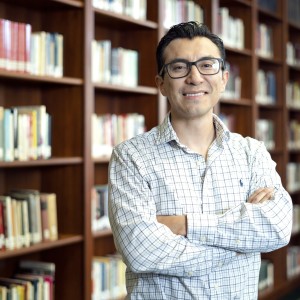Laboratory for the Detection of Particles, Astroparticles, and Radiation (LEOPARD)
The Particle, Astroparticle, and Radiation Detection Laboratory (LEOPARD) provides the necessary environment and infrastructure for students and researchers at USFQ to carry out cutting-edge research in the field of physics and engineering, to train, collaborate with their peers from institutes, local or foreign institutions or experiments, and reach out to the community through educational events that facilitate public understanding of science.
Several researchers and students of the Laboratory belong to the CMS Collaboration (Compact Muon Solenoid) of the LHC (Large Hadron Collider) of CERN, and to the LAGO Collaboration (The Latin American Giant Observatory). In general, its staff conducts research in particle physics, astroparticles, and develops detection systems.
LEOPARD's research lines include the study of data on particle colliders, cosmic ray analysis for the identification of high-energy phenomena and monitoring of space weather, the use of proven technologies for the detection of particles and astroparticles, as well as the development of new technologies in these fields.
High energy physics, astroparticles, data acquisition systems
The LEOPARD Laboratory develops particle/astroparticle detection systems and analyzes data, collected locally, or by international experiments of which it is a member, to conduct cutting-edge research in physics and engineering, train its students, and educate the community.
The LEOPARD Laboratory will be a leading academic contributor to major international particle and astroparticle physics experiments and a regional benchmark for local development of technology and science related to particle detection.
Publications
CMS experiment:
- Most relevant publications (50+ citations)
- All publications made
LAGO experiment:
- All LAGO publications
Degree work:
- Search for exotic particles with a long lifetime with CMS-OpenData, by Felipe Navarro Cordero <
- Upgrading the data acquisition system of WCDs used in LAGO project, by Bryan Talavera <
- Top Quark radius measurement with the CMS experiment, by Jorge Martínez
- Design of a new acquisition system based on Red Pitaya for the particle detectors used in the LAGO collaboration, by Marco Ramos
- Feasibility study for the measurement of acausal particles with wrong displaced vertices at the LHC, by Raquel Quishpe
- Data-driven background estimation study for stealth supersymmetry searches in events with structure-rich jets and low missing energy in pp collisions at 8 TeV Particle physics, by Santiago Paredes
Collaborations
The Leopard Laboratory collaborates with:
CERN's CMS experiment

LAGO Collaboration


